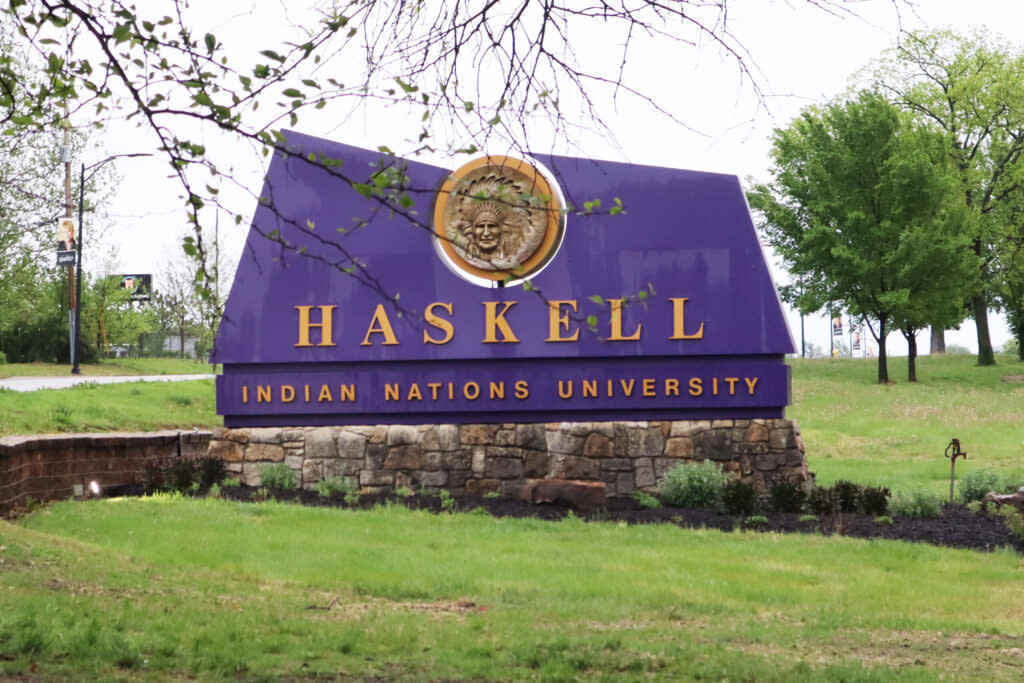U.S. House panels review ‘startling’ allegations at Bureau of Indian Education university

The entrance to Haskell Indian Nations University at Lawrence, Kansas, in April 2024. A recently released federal investigative report has described the campus as "dysfunctional." (Max McCoy/Kansas Reflector)
WASHINGTON — Members of two U.S. House panels, during a hearing this week, examined allegations of sexual assault, bullying and retaliation at the U.S. Bureau of Indian Education-operated Haskell Indian Nations University.
Haskell, a Lawrence, Kansas, school that is the only four-year college operated by the bureau, has come under scrutiny over its response to a range of allegations from students, which were documented in a scathing report from the Bureau of Indian Education, an agency within the U.S. Interior Department.
The report says the school did not act on sexual abuse claims, lacks institutional control to prevent theft and other abuses and is unresponsive to student complaints, the Kansas Reflector summarized in an April opinion piece.
Students and other interested parties asked the bureau to release the report, which the department finalized in January 2023, but the government withheld it for well over a year.
Responding to a Freedom of Information Act request from the nonprofit Public Employees for Environmental Responsibility and a federal FOIA suit, the bureau initially released an unrelated report in November 2023.
The bureau finally released the report students and PEER had requested in April 2024 — with heavy redactions.
Tuesday’s hearing was scheduled after two U.S. House committees with jurisdiction over the matter — Education and the Workforce and Natural Resources — launched an investigation in early July into “allegations of misconduct” involving the university and the Department of the Interior.
‘Startling’ report
The GOP committee chairs, Education Chairwoman Virginia Foxx of North Carolina and Natural Resources Chairman Bruce Westerman of Arkansas, led a July 2 letter to Tony Dearman, director of the Bureau of Indian Education, expressing their concerns and requesting several documents to assist with their investigation.
“The students of Haskell have been deprived of what should be the No. 1 guarantee in our educational system: a safe learning environment,” Rep. Burgess Owens, chairman of the House Subcommittee on Higher Education and Workforce Development, said Tuesday.
Owens’ panel conducted the hearing alongside the House Committee on Natural Resources’ Subcommittee on Oversight and Investigations.
The Utah Republican called the allegations in the Bureau of Indian Education’s report “startling” and was especially concerned with an apparent lack of transparency.
“Perhaps more troublesome is that the report’s eventual production was delayed,” he said. “Evidence points to possible omissions and alterations to the final, publicly available copy.”
“With each of these new developments, the academic integrity of the institution has been severely compromised,” he said.
Leadership issues
The university, which was founded in 1884 as a boarding school for Native American children, has seen a revolving door of leadership recently, with eight presidents in six years.
At the hearing, Bryan Newland, the assistant secretary for Indian Affairs at the Department of the Interior, said that has contributed to the school’s issues.
“There have been a lot of challenges on setting clear leadership expectations at Haskell for many years,” he said.
“The high turnover in Haskell presidents and leadership over the years … has allowed some of the problems with these factions or these cliques on campus to fester,” he added.
House Republicans have criticized Newland, Interior Secretary Deb Haaland and other officials over claims that they ignored “Haskell students’ pleas for justice.”
Pressed Tuesday by Democratic Rep. Mark Takano of California on why it took multiple FOIA requests to produce the final 2023 Bureau of Indian Education report detailing the allegations at Haskell, Newland said “that report should have been disclosed.”
Retaliation
Rep. Melanie Stansbury, ranking member of the Natural Resources subcommittee and a New Mexico Democrat, said she saw two issues: a “toxic work culture that needs to be fixed inside the administration and faculty of the school,” and “an accountability follow-up issue” with the Bureau of Indian Education.
Ronald Graham, who was the president of Haskell from May 2020 to May 2021, said “something is terribly wrong” at both the school and the Bureau of Indian Education.
“It began long before I arrived. I uncovered it, I reported it, and I was fired for it. It (continued) after I left, and all indications are it’s still continuing to this day,” Graham said.
Clay Mayes, former cross country coach at the school who was fired in April 2022, felt that he had been retaliated against for accusing colleagues of theft and sexual misconduct at Haskell.
Mayes, a member of the Cherokee and Chickasaw tribes, said there is a “complete fear” to report things at Haskell due to “certain alliances.”
“Certain people figure out who has the protection, so new employees will become friends with this one group because they get protection,” he said. “So the culture is: Don’t report it and get along with who’s basically getting the most out of the system.”
Reporting sexual assault on college campuses
“Indigenous students experience sexual assault at a higher rate than any other racial group,” according to Emily Martin, chief program officer for the National Women’s Law Center. She also noted that more than 1 in 4 women are sexually assaulted in college.
“Students often tell us they’re discouraged from reporting sexual assault and harassment at their schools,” Martin told the joint panel. “When they do report, they tell us they’re met with delays, that the system is stacked against them, that the trauma they experienced, both from their assault and from going through the reporting and investigatory process, stays with them.”
Martin said that as a federally operated educational program, Haskell is “legally required to protect its students from sex discrimination, including sexual assault.”
The post U.S. House panels review ‘startling’ allegations at Bureau of Indian Education university appeared first on Nebraska Examiner.

